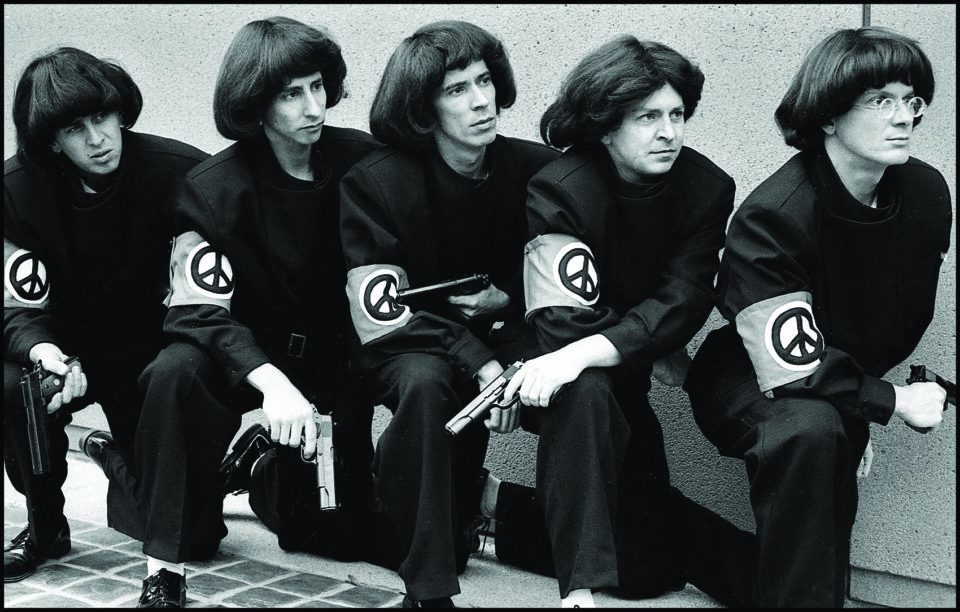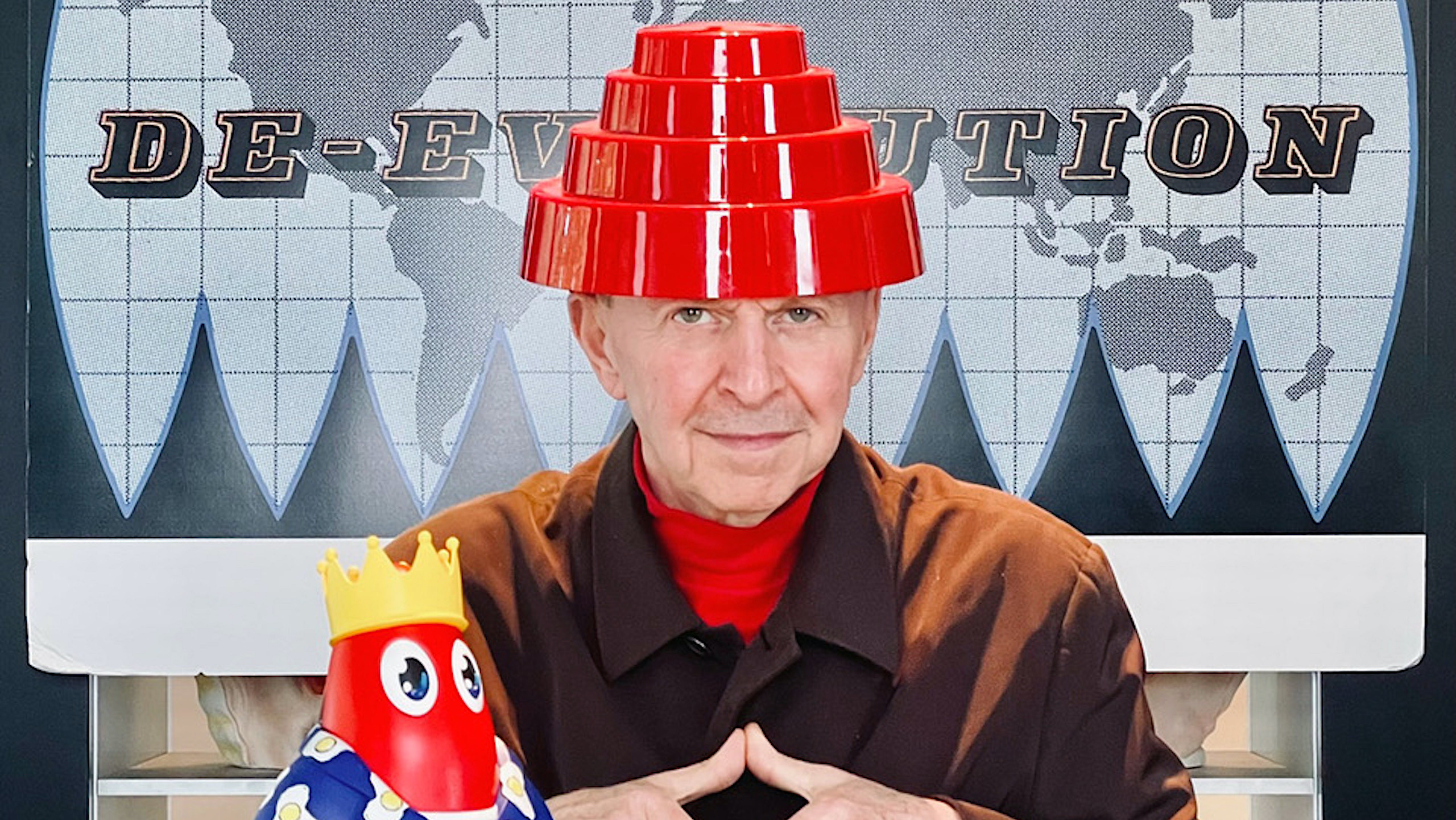“I have to continue on my quest for self-expression,” declares Gerald V. Casale with a laugh. “I can’t be silenced. I mean, I’m still the guy who started Devo, and I haven’t lost the spirit.”
Nearly 50 years after Devo made its live debut at Kent State University’s Creative Arts Festival, Casale—who originally co-founded the innovative band as part of an art project with fellow Kent State student Bob Lewis—is releasing the six-song The Invisible Man EP for Record Store Day Black Friday. Created in collaboration with Josh Freese (Guns n’ Roses, Weezer, Vandals) and Steve Bartek (Oingo Boingo), the EP features three mixes of the pulsating title track along with three new remixes of Casale’s 2021 single “I’m Gonna Pay U Back.”
“Devo was always about collaboration and innovation, experimentation and a sense of humor,” he explains. “I’m just collaborating now with people who still have fun creating, where there’s no guarantee that there will ever be a payday or anything. It goes back to why you write songs or play music to begin with—which is the pure inspiration or enjoyment of it, not the guarantee of financial success.”
With their electronic grooves, synth-driven melodies, and darkly humorous lyrics, “The Invisible Man” and “I’m Gonna Pay U Back” are very much in the tradition of such classic Devo tracks as “Freedom of Choice” and “It’s a Beautiful World,” only with a level of anger that feels most appropriate for an age in which the band’s original theory of de-evolution has proved to be horribly prescient.
From his home in Northern California, Casale spoke with us about the new EP, the continuing de-evolution of mankind, being “a resistant personality,” and eating squid risotto with Martyn Ware of Heaven 17.
When you released “I’m Gonna Pay U Back” last year, you spoke of how “The Invisible Man” was already in the works—and now the new EP includes three remixes of “I’m Gonna Pay U Back.” Is there a direct connection between the two songs?
I think they’re in the same universe. As you see in the video [for “The Invisible Man”], the singer thinks he wakes up from a nightmare, which is the conflict in the “I’m Gonna Pay U Back” video. And he goes for a little walk in a kind of Teletubby environment, and it turns out that “waking up” is actually part of the dream.
And “The Invisible Man,” of course, is my theme about how human nature is bifurcated. We fight with ourselves because the species has a terrible dark side. As you can see in the current culture we live in, there’s a palpable sense of evil manifesting itself daily. It’s the dark side of human nature winning out over what makes us valid as a species. The invisible man is that part of us that we try to suppress rather than turn around and face. So the song’s about facing that duality, rather than trying to put it in a lockbox and hide it.
“It goes back to why you write songs or play music to begin with—which is the pure inspiration or enjoyment of it, not the guarantee of financial success.”
And devolving further as a result…
De-evolution is real; it went beyond our expectations, and now you see it all the time. It’s always being applied, of course, to the horrible alternate reality nightmare of our politics. And recently with Elon Musk’s takeover of Twitter, there were three huge references on a Google newsfeed about what he’s done to “devolve” Twitter into chaos. It’s expanded way beyond our facile, smart-ass college guy concept. It’s real, and you can see it in the way that the planet’s burning up, but people have their heads in the sand about it like the proverbial ostrich. They’re not stepping up; they’re running away.
Climate change is demonstrably real at this point, and you’d think people would want to solve it, or at least do something to address it.
Well, there you go. See, that was Devo. We were like musical versions of Spock from the original Star Trek. But logic has been thoroughly tamped down; I mean, the boot came down in the face of logic long ago. All the pundits and all the big journalists, they write almost gleefully about post-truth society, and how facts don’t matter, and it’s all just entertainment.

Devo, outside Warner Bros. in Burbank, 1980
Whereas Devo certainly delivered entertainment, but you guys were never just about that. There was always an underlying message to your music, even if some of your listeners just got off on the entertainment aspect and ignored the message.
Well, we were trying [laughs]. And that goes all the way back to when I was a student and I was a political activist, and we protested the expansion of the Vietnam War into Cambodia without an act of Congress that Nixon had perpetrated on us. That’s how the students got killed on May 4, and two of them were my friends. And at that point, either I would’ve had to join the Weather Underground and go to jail or die—and that wasn’t gonna fix anything—or come up with some creative response. I certainly wasn’t gonna put my head in the sand and go away.
I mean, that’s what the masters of tyranny want you to do. They want you to give up. They want you to kill yourself, basically. They love incapacitated people strung out on drugs, staying in their bedrooms. I was the guy that the executives called “the difficult artist,” because I don’t just accept things as they are. I don’t accept, I don’t forget—I keep things in mind and I’m what they call a “resistant personality.” I hate illegitimate authority. The more they want to put their foot in your face, and the more they want you to give up, that’s not gonna work with Gerald Casale. You go down fighting; I mean, really, what are your choices in the end?
“I hate illegitimate authority. The more they want to put their foot in your face, and the more they want you to give up, that’s not gonna work with Gerald Casale.”
Do you think that aspect of your personality has served you well in the music business?
Well, no [laughs]. But I don’t have a choice.
Martyn Ware of Heaven 17 did a couple of remixes of “The Invisible Man” that aren’t on the EP, but are going to be available digitally. How did those come about?
Martyn’s an old friend of mine, and he liked the song and offered to do [the remixes] as a favor. And that’s so satisfying, because you always want to be part of a community of recording artists and musicians who respect and are inspired by each other’s work. I didn’t care in the beginning how many people made fun of Devo and how many people threw beer cans at us; we felt empowered by it in a way, if we didn’t respect them. The only [thing] that can hurt you, is, like, if David Bowie had said, “Devo sucks.” Or if Iggy Pop had said, “What the fuck is this?” Or Brian Eno said, “I don’t wanna produce you.” But that didn’t happen. The people we liked, liked us.
How did you and Martyn first connect?
[Heaven 17] stayed in LA for a week doing business and rented this house in the Hollywood Hills, and we went up there and just had this wonderful time for a whole weekend. This house had a wine cellar, and why we were allowed to raid it, I don’t know—maybe we weren’t [laughs]. But Martyn was a guy like myself who knew a lot about wine, and we both loved Italian Brunellos and Barbarescos and Barolos. And so we’re down in this beautiful wine cellar, picking these bottles out—great vintages—and popping ’em while sitting by the pool on a Saturday afternoon talking art and music.
It was fantastic, and we just stayed friends. He had a house on an island off of Venice, and I hung out there with him in the late-’80s when Devo toured Europe. He showed me where it was safe to eat in Venice, because with all the tourism it’s one of the few places in Italy where you can actually get a bad meal. He’d take me down these meandering mazes by little side canals to this incredible place where all they do is squid risotto. And once you taste it, you’re spoiled, because you’ll never have one as good again.
“The only thing that can hurt you, is, like, if David Bowie had said, ‘Devo sucks.’ Or if Iggy Pop had said, ‘What the fuck is this?’ Or Brian Eno said, ‘I don’t wanna produce you.’ But that didn’t happen. The people we liked, liked us.”
What are you listening to these days?
My wife—who’s younger than me and very into music—is willing to spend the time, almost like a researcher, finding out about new music. Because it’s not so easy anymore. There was a time that anything good made it onto the radar; there was a system for it, and an A&R man actually knew something and would take an artist and stand by ’em for three or four records, and all the best stuff was in your face. But that’s not true now. Now, you’re listening to corporate dreck, and then all these musicians that are doing great, cool stuff are just out there lost in the forest.
She’s played me stuff that’s so far afield from the crap that’s forced down your throat every day. And I love it, because a lot of it’s taking influences from all the way back to the ’60s and from ’80s new wave and combining things in a weird creative fusion that’s old and new at the same time. But can I tell you the names of these groups now? No, I’d have to ask her again [laughs].
Do you hear a lot of Devo influence in this stuff, as well?
You know, I do. It always pops right out, and of course I like it. It’s like, “Gee, that’s something I would’ve done. Oh, I did!” FL









